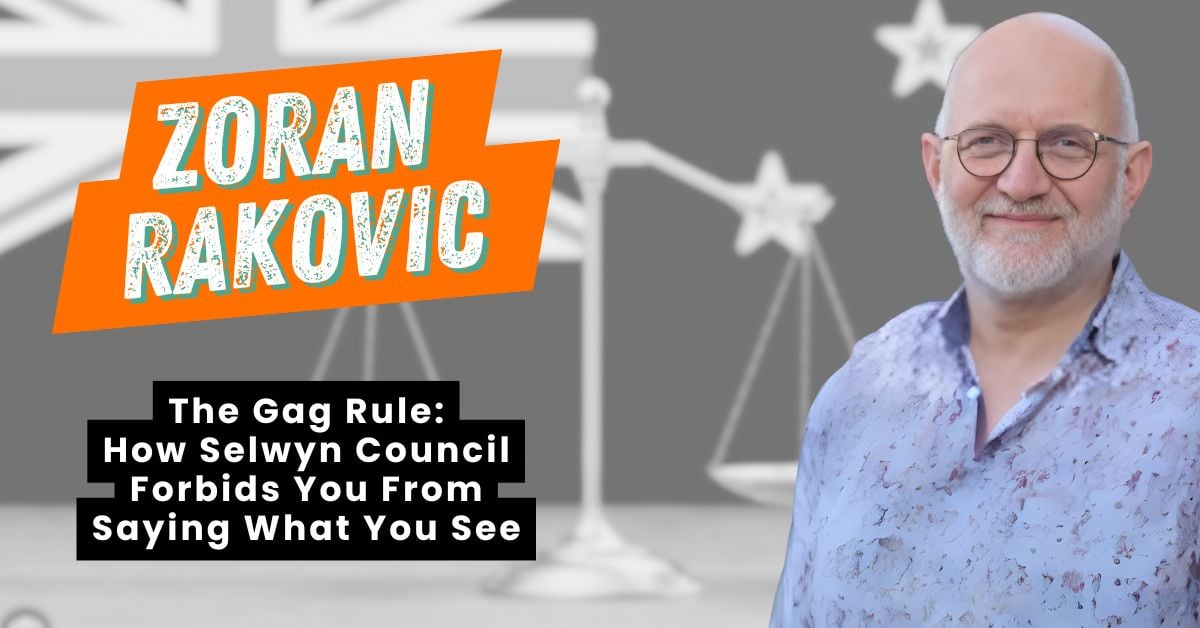
by Zoran Rakovic
In the Selwyn District Council's standing orders—those arcane pages that tell you when to stand, when to sit, and precisely how to whisper politely into the void—there lies a curious clause. It forbids members of the public from speaking critically about elected councillors or bureaucrats when they address the council. You can thank them, you can flatter them, you can even suggest a minor procedural improvement—just don’t you dare suggest that someone sitting before you has failed you. Because that would be “offensive.” That would breach the decorum of the chamber. That would be illegal—at least according to their own rules.
Now let us pause for a moment and inhale the madness. Here we are, in a liberal democratic society, where your rates pay their salaries, where your votes installed these people into office, and where you, by some miracle of bureaucratic indulgence, are allowed to speak up to five minutes at a meeting—but only if you do not offend the powerful. It is as if the citizen has been invited to court, but only if they agree to bow and never raise their voice. If this is democracy, then the word has become a skin stretched over the bones of something far older and more feudal.
John Stuart Mill warned us about this. He saw clearly that the greatest danger to liberty was not always found in the boot of the monarch, but in the silent tyranny of convention. “The worth of a state in the long run is the worth of the individuals composing it,” he wrote in On Liberty. And what is the worth of Selwyn’s rules? They reflect a fear—not of violence or disorder, but of scrutiny. And scrutiny, my friends, is the enemy of comfort.
Let us not be naïve. Every system produces its own mechanisms of self-preservation. Foucault taught us that power does not just operate by saying “no.” It says “yes,” but only to that which reinforces its own position. The standing orders do not simply silence the critic—they manufacture the compliant subject. A member of the public who learns the etiquette of self-censorship, who rehearses their gratitude, who wraps criticism in such velvet that it ceases to be criticism at all. That is the real effect of these rules: they do not prevent disorder, they manufacture docility.
This is not just absurd. It is ultra vires. The Local Government Act and the New Zealand Bill of Rights Act 1990 are clear: freedom of expression is protected. Section 14 of the NZBORA states: “Everyone has the right to freedom of expression, including the freedom to seek, receive, and impart information and opinions of any kind in any form.” The Council cannot, through internal rulemaking, restrict what the Constitution protects. They are acting outside their legal authority—nakedly, blatantly, and routinely.
And yet, there is silence. Not just in the chambers, but in the community. Václav Havel, writing from the belly of the Communist beast, warned that “the less justified a man is in claiming authority, the more he will insist on it.” Here, in this sleepy corner of Canterbury, power does not arrive in tanks—it arrives in PDFs, in procedural flowcharts, in friendly signage and polite HR policies. And it hides its repression behind the mask of decorum.
To stand in public forum and be told you cannot speak ill of your representatives—what is this but Newspeak? George Orwell saw this coming in 1984, when he warned of a world in which criticism becomes not merely punishable, but unthinkable. The Council, by prohibiting certain forms of expression, does not simply ban dissent. It rewrites the very category of “appropriate speech.” One must speak like a supplicant, not a citizen. One must speak as if the council chamber is a dinner party and not a forum of democratic deliberation.
Some will protest: “But we must maintain respect.” And yes, respect is a fine thing. But real respect is earned through performance, not enforced through silence. As Popper reminds us, democracy survives only when citizens act as watchdogs, not lapdogs. “The survival of democracy depends on the readiness of people to act as watchdogs.” But how can we bark if our muzzles are sewn shut?
Ah, but there is always the bureaucratic counterstroke. They will say: “We’re not prohibiting freedom of speech. You can write letters. You can go on Facebook. You can run for council yourself.” This is like a king telling his peasants that they are free to complain, as long as they do so in private, and preferably in Latin.
Chomsky called this tactic manufactured consent. If power can convince the governed that criticism is impolite, unproductive, or hysterical, it no longer needs to suppress dissent—it merely renders it illegible. And the public, yearning to be seen as reasonable, falls into line. Selwyn’s standing orders do not simply silence critics; they elevate sycophants.
Consider the absurd asymmetry: the council can publicly accuse ratepayers of being uninformed, of misunderstanding budgets, of failing to appreciate complexity. But when a citizen accuses the council of incompetence, they are ruled “out of order.” The emperor may strip you naked, but you may not comment on his own nudity.
Žižek would say this is ideology in its purest form. A fantasy that functions only by denying its contradictions. The public forum is said to be a place for participation, but participation is only allowed on terms set by those being scrutinized. It is not dialogue, but theatre. Not freedom, but performance. And worst of all, it is accepted as normal.
Let us not forget the wisdom of Arendt. In her study of totalitarianism, she showed how evil is not always monstrous. Sometimes it is banal, procedural, tidy. The Council’s prohibition on criticism is not enforced by jackboots. It is enforced by well-formatted minutes and laminated signs. It is enforced by the refusal of any councillor to stand up and say: “This is wrong.” Their silence is not neutrality. It is complicity.
And where are the legal minds in all this? Where are the calls from within to test the limits of standing orders against the guarantees of the Bill of Rights? Where is the Ombudsman? Where is the legal advice reminding councillors that they are not above the Constitution? The rule forbidding criticism is not just unjust. It is, in the legal sense, invalid. It cannot stand when challenged. The only reason it persists is because it has never been tested. Bureaucratic overreach relies on apathy as much as on arrogance.
Illich saw this clearly. Modern institutions, he wrote, create rituals that legitimate themselves. The standing orders are such a ritual. They produce the illusion of engagement while systematically excluding the very energy that democracy needs to breathe: challenge, dissent, unruliness. What is public input if the public must first declaw itself to be heard?
So, what should be done?
First, we must name the absurdity. This is a gag rule. A rule that forbids citizens from expressing their political judgment in a political forum. It is an affront to democracy and a breach of law.
Second, councillors who claim to represent the people must publicly renounce it. Not just privately grumble. Not just murmur about “tone.” They must demand its removal. Because if you claim to believe in democracy, but remain silent while its lifeblood—speech—is bled from the body politic, then your belief is a lie.
Third, citizens must speak anyway. Speak critically. Speak openly. If you are shut down, make it public. If you are silenced, write letters, publish videos, create records. Expose the rule for what it is: a mechanism of self-protection masquerading as civility.
In a healthy democracy, the powerful expect to be criticised. They prepare for it, defend against it, grow from it. In a decaying one, they criminalise it. The Selwyn Council’s standing orders show us where we are on that spectrum.
There is one final warning to offer, and it comes from Castoriadis: institutions tend to become autonomous, closing themselves off from the very society they were meant to serve. When councils start writing rules that protect themselves from you, they are no longer your servants. They have become your lords. And when they do this with a smile and a pat on the head—when they say “you’re welcome to speak, just don’t offend”—they are not inviting participation. They are performing domination.
It is time to tear off the polite veil. Time to say: the emperor has no clothes, and no standing order shall forbid us from noticing.
Let the councillors hear this clearly: we are not here to flatter you. We are not here to admire your workload or your virtue. We are here to hold you accountable. And if you cannot endure the sound of criticism, you should not be sitting in those seats. The people are not your audience. You are ours.
And we will speak.
Originally published on To Make The Darkness Conscious.
